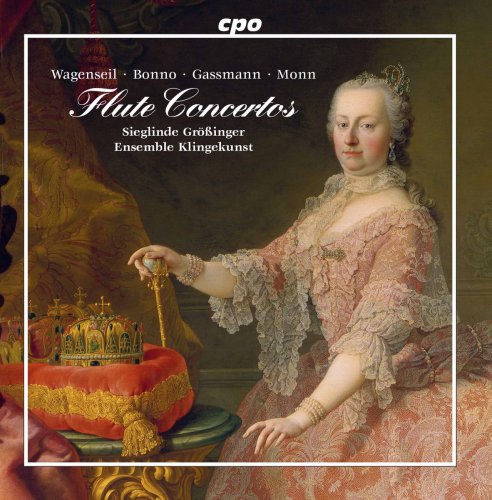
Sieglinde Größinger & Ensemble Klingekunst - Wagenseil, Bonno, Gassmann & Monn: Flute Concertos (2017)
BAND/ARTIST: Sieglinde Größinger, Ensemble Klingekunst
- Title: Wagenseil, Bonno, Gassmann & Monn: Flute Concertos
- Year Of Release: 2017
- Label: CPO
- Genre: Classical
- Quality: flac lossless +booklet
- Total Time: 01:02:26
- Total Size: 320 mb
- WebSite: Album Preview
Tracklist
---------
01. Flute Concerto in G Major: I. Allegro con spirito
02. Flute Concerto in G Major: II. Andante
03. Flute Concerto in G Major: III. Allegro
04. Flute Concerto in G Major: I. Allegro
05. Flute Concerto in G Major: II. Adagio
06. Flute Concerto in G Major: III. Allegro
07. Flute Concerto in C Minor: I. Allegro
08. Flute Concerto in C Minor: II. Adagio non tanto
09. Flute Concerto in C Minor: III. Allegro di molto
10. Flute Concerto in B-Flat Major: I. Allegro
11. Flute Concerto in B-Flat Major: II. Larghetto
12. Flute Concerto in B-Flat Major: III. Allegro
13. Flute Concerto in D Major: I. Vivace
14. Flute Concerto in D Major: II. Largo
15. Flute Concerto in D Major: III. Allegro
CPO's first collaborative project with Klingekunst and the ensemble’s soloist and leader Sieglinde Größinger presents CD premiere recordings of the earliest Viennese flute concertos, which date from the reign of Empress Maria Theresa. The selected concertos by Georg Christoph Wagenseil, Giuseppe Bonno, Florian Leopold Gassmann, and Matthias Georg Monn, heard here on historical instruments, represent a significant contribution to the artistic recovery of the forgotten Viennese music culture of this epoch, a field that is only beginning to be researched. When Emperor Carl VI died in 1740, his successor Maria Theresa inherited a state budget burdened by heavy deficits. Forced to adopt economic measures, the new Empress suspended the operation of the court orchestra and then offered its services to interested parties. However, the artistically marginalized musicians did not accept defeat when these unexpected developments put them in an existentially precarious position. No longer obliged to serve and obey a court aesthetic, they delighted in experimentation with new styles and forms of expression. The revolutionary character of these exciting times very much may be viewed as preparation for the Viennese classical period. Moreover, the flute now became a solo instrument for use in the orchestra and concert performances. Until about 1740 it was only rarely employed and then merely for additional tone colour, but now it first enjoyed its share of spotlight.
---------
01. Flute Concerto in G Major: I. Allegro con spirito
02. Flute Concerto in G Major: II. Andante
03. Flute Concerto in G Major: III. Allegro
04. Flute Concerto in G Major: I. Allegro
05. Flute Concerto in G Major: II. Adagio
06. Flute Concerto in G Major: III. Allegro
07. Flute Concerto in C Minor: I. Allegro
08. Flute Concerto in C Minor: II. Adagio non tanto
09. Flute Concerto in C Minor: III. Allegro di molto
10. Flute Concerto in B-Flat Major: I. Allegro
11. Flute Concerto in B-Flat Major: II. Larghetto
12. Flute Concerto in B-Flat Major: III. Allegro
13. Flute Concerto in D Major: I. Vivace
14. Flute Concerto in D Major: II. Largo
15. Flute Concerto in D Major: III. Allegro
CPO's first collaborative project with Klingekunst and the ensemble’s soloist and leader Sieglinde Größinger presents CD premiere recordings of the earliest Viennese flute concertos, which date from the reign of Empress Maria Theresa. The selected concertos by Georg Christoph Wagenseil, Giuseppe Bonno, Florian Leopold Gassmann, and Matthias Georg Monn, heard here on historical instruments, represent a significant contribution to the artistic recovery of the forgotten Viennese music culture of this epoch, a field that is only beginning to be researched. When Emperor Carl VI died in 1740, his successor Maria Theresa inherited a state budget burdened by heavy deficits. Forced to adopt economic measures, the new Empress suspended the operation of the court orchestra and then offered its services to interested parties. However, the artistically marginalized musicians did not accept defeat when these unexpected developments put them in an existentially precarious position. No longer obliged to serve and obey a court aesthetic, they delighted in experimentation with new styles and forms of expression. The revolutionary character of these exciting times very much may be viewed as preparation for the Viennese classical period. Moreover, the flute now became a solo instrument for use in the orchestra and concert performances. Until about 1740 it was only rarely employed and then merely for additional tone colour, but now it first enjoyed its share of spotlight.
Year 2017 | Classical | FLAC / APE
As a ISRA.CLOUD's PREMIUM member you will have the following benefits:
- Unlimited high speed downloads
- Download directly without waiting time
- Unlimited parallel downloads
- Support for download accelerators
- No advertising
- Resume broken downloads


